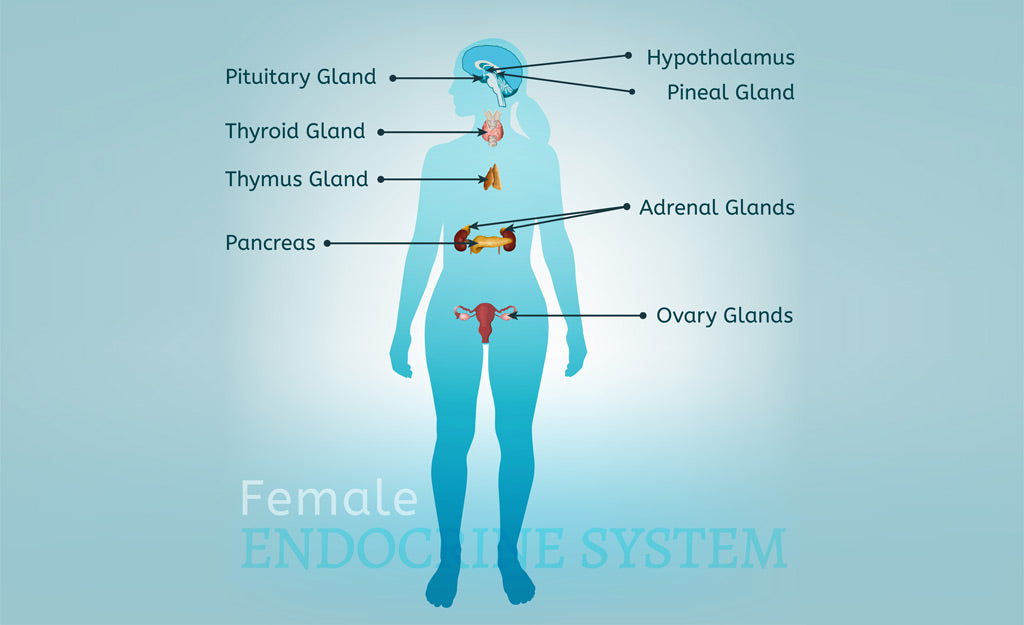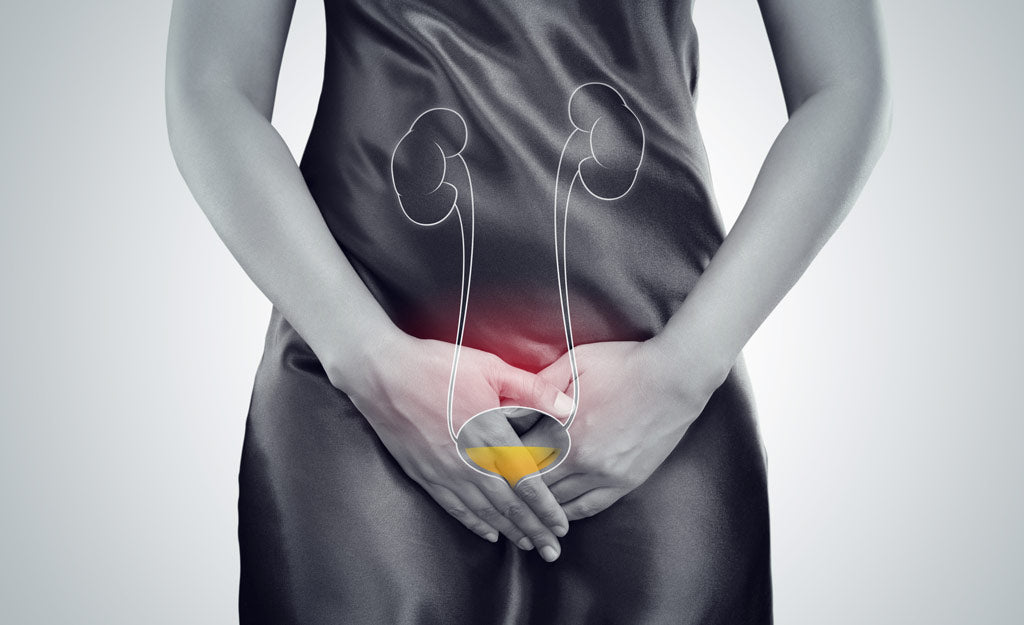The endocrine system is composed of the hypothalamus, pituitary gland, adrenal glands, thyroid gland, parathyroid gland, pineal gland, pancreas, and ovaries (or testes in males). When in balance, they create a dance of hormones which regulate and maintain homeostasis within the body. When out of balance, however, disease and disruption occur.
Hormones are the messengers for the body, but the glands are the conductors.
The endocrine system regulates itself through a negative feedback process. When one gland is activated, another works to deactivate it so the body does not run out of control.
Poor communication within the endocrine system, especially along the hypothalamic-pituitary-adrenal (HPA) axis, contributes to the negative symptoms associated with reproduction (including menopause). An example of this is abnormal activity in the sympathetic nervous system (SNS) as it directly impacts the adrenal glands. When stressed, this pathway increases the production of cortisol and less of dehydroepiandrosterone (DHEA). DHEA is the base hormone that helps produce other hormones, including testosterone and estrogen.
ADRENAL GLANDS
The adrenal glands are located on top of each kidney. They secrete the hormones cortisol and aldosterone which are implicated in some of the common complaints of nervous system overstimulation and physical ailments. High secretory times of the adrenal glands are between 8 - 10 am, with their lowest around midnight.
The adrenal glands signal the hypothalamus to activate the sympathetic nervous system (via the amygdala, medulla and adrenal cortex) and secrete hormones such as corticotrophin-releasing hormones, epinephrine and norepinephrine, glucocorticoids, cortisol, and PAF. Small quantities of androgens are also manufactured by the adrenal cortex, usually in equal amounts in both males and females. These include androstenedione, androsterone, DHEA, and testosterone.
HYPOTHALAMUS
The hypothalamus essentially controls and regulates the endocrine system as well as the reproductive system and the nervous system. Most notably, the hypothalamus influences stress responses and the regulation of the hormones which have a direct influence on the balance and functions of the reproductive organs. Homeostasis (balance) of the HPA axis creates a highly regulated feedback loop to the reproductive organs which, in turn, reduce any reproductive symptoms and improve the health of its cycles.
Here is an overview of the specific actions of the hypothalamus:
- regulates metabolic processes
- controls the autonomic nervous system (PSNS and SNS)
- secretes hormones which affect the pituitary and adrenals
- controls body temperature, hunger and thirst
- controls circadian rhythms and sleep cycles
- releases adrenocorticotrophic hormones
- stimulates pituitary function
- regulates immune function
- regulates/controls hormone levels via pituitary gland and thyroid
Of course, there are factors that activate the hypothalamus which work largely via negative feedback mechanisms. The increased sensitivity or overstimulation of the actions of the hypothalamus are caused by:
- Stress
- Inflammation (cytokines and toxins)
- Oestrogen or thyroid hormones
- Pain
- Nutritional deficiencies
- Serotonin production (inhibitory)
- High concentration of GABA (inhibitory neurotransmitter)
OVARIES
Aside from their important function of storing and maturing eggs for reproduction, the ovaries have another crucial role – producing hormones before, during and after menopause.
Far from the popular myth that they dry out, shrivel up and become completely useless at menopause, the ovaries perform a vital function during a woman's entire postmenopausal life. As women naturally age, a part of the ovary – the theca which is the outer covering where eggs grow and develop – does shrink. However, the stroma in the inner part of the ovary actually becomes active at menopause for the first time in a woman's life.
This just goes to show that the ovaries continue to function after menopause, working in concert with the skin, liver and fat to produce hormones. The small number of hormones produced by the postmenopausal ovaries and adrenal glands promote bone health and skin suppleness, support sexual function, protect against heart disease and contribute to a woman's health and well-being.
The removal of the ovaries is a great trauma to a woman at any age.
While it is true that reproduction is the most important role of the ovaries, it is not their only purpose. These reproductive organs have as much to do with the maintenance of a woman's own life as with her role of bringing other lives into the world. Menopause simply sees a shift from reproductive responsibility to maintenance function.
PANCREAS
The pancreas is an organ which belongs to both the digestive and endocrine systems. It is located in the abdomen and plays an essential role in energy production by converting the food we eat into fuel for the body.
The specific functions of the pancreas include:
- Production and secretion of pancreatic enzymes into the small intestines to help digest foods (especially proteins and also carbohydrates and lipids)
- hormone production of insulin which is needed to regulate blood sugar levels
- control of metabolism
PARATHYROID GLAND
The parathyroid gland is located behind the thyroid in the neck. The specific role of the parathyroid gland is to control calcium levels is in the body. It also regulates how much calcium is circulating in our blood and being deposited in our bones.
PINEAL GLAND
The pineal gland is located between the eyebrows and is also known as the third eye in metaphysical circles. Some people even like to mystically refer to it as the 'principal seat of the soul'.
From a pathophysiological point of view, that main function of the pineal gland is to produce the hormone melatonin (modulation of sleep patterns). The pineal gland also influences the secretion of sex hormones (FSH and LH) by the pituitary gland.
PITUITARY GLAND
The pituitary gland is considered to be the master gland of the brain. It produces many hormones that travel through the body, directing certain processes or stimulating other glands to produce hormones. The pituitary gland governs puberty, sexual development and reproductive function.
The anterior (front) pituitary gland produces:
- Prolactin – stimulates breast milk production after childbirth, affects sex hormone levels and fertility
- Growth hormone (GH) – stimulates growth in childhood and maintains body composition in adults (muscle and bone mass)
- Adrenocorticotropic hormone (ACTH) – stimulates the production of cortisol (stress hormone) by the adrenal glands
- Thyroid stimulating hormone (TSH) – stimulates the thyroid gland to produce thyroid hormones that influence metabolism, growth, energy and nervous system activity
- Luteinizing hormone (LH) – stimulates ovulation in women by decreasing oestrogen and increasing progesterone
- Follicle stimulating hormone (FSH) – activates the ovaries to produce oestrogen and develop fertile eggs
The posterior (back) pituitary stores the following hormones:
- All of the above
- Antidiuretic hormone (ADH) – also called vasopressin, regulates water balance in the body and conserves it by reducing the amount of water lost in urine
- Oxytocin – initiates breast milk flow and the progression of labour in childbirth
THYROID
The thyroid gland is part of the endocrine system yet medically, it's only seen as an independent gland. The interactivity of the thyroid with the rest of the endocrine system is usually not considered, which is why women who have thyroid issues often develop secondary symptoms. These are not linked to thyroid dysfunction and often leave women wondering why they are feeling unwell.
Each and every function in the body is connected and the thyroid is no different. As part of the endocrine system, the thyroid plays a vital role in the body’s metabolism by maintaining homeostasis in terms of energy production versus energy output. This is a very important function so let’s look at what happens when something is wrong with the thyroid.
Causes of thyroid imbalance
-
Stress (general). Because the thyroid is responsible for maintaining homeostasis, it sort of plays the role of a referee. Whenever stress levels are excessive for an extended period, there is increased energy production and the thyroid withdraws its energy stimulating hormones. This can lead to thyroid imbalance.
-
Sugar, caffeine and stimulants. Too much circulating sugars in the body as well as excessive caffeine consumption and other stimulants can cause an imbalance of energy-stimulating hormones in the thyroid.
-
Oxidative stress. The thyroid is a very sensitive gland which easily reacts to an imbalance between free radicals and antioxidants in your body. Heavy metals, pollution, smoking, pesticides and circulating free radicals from the environment or an unhealthy diet significantly damage thyroid tissues.
-
Mineral deficiencies. Thyroid function is heavily dependent on certain minerals. Iodine is the most well-known but zinc, selenium, and potassium are also needed. Besides being commonly depleted in our soils and diets, mineral deficiency can be brought about by synthetic hormone intake (contraceptives, HRT and other hormonal devices and treatments). In addition to this, synthetic hormones cause an imbalance in the thyroid by disrupting the overall endocrine system. Women often wonder why after 20 years of being on the pill they can’t seem to lose weight. Well, that’s the reason.
- Food sensitivities. Because the thyroid is such a sensitive gland, it reacts to immunological factors that destroy tissues. People who are sensitive to gluten, sugar and dairy often develop autoimmune thyroid issues such as Hashimoto's, which is in epidemic proportions nowadays.
Summary
Happy hormones contains ingredients which have been shown to reduce the symptoms of menopause and support female reproductive health. If you are suffering from symptoms of menopause take some time and read through the thousands of ladies experiences with our approach.
You can read more about this in our article: How Happy Hormones works.










Leave a comment
This site is protected by hCaptcha and the hCaptcha Privacy Policy and Terms of Service apply.